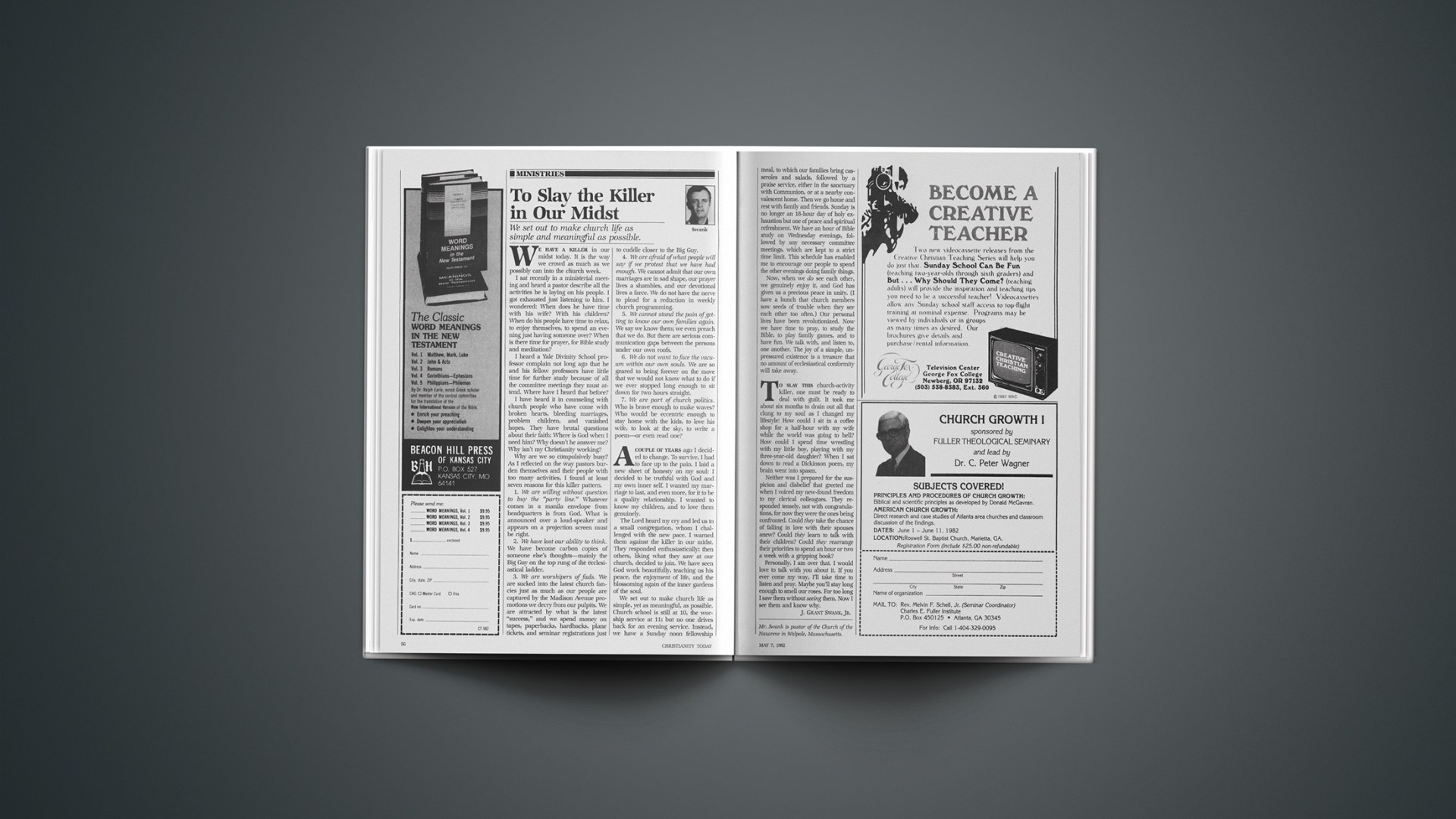We have a killer in our midst today. It is the way we crowd as much as we possibly can into the church week.
I sat recently in a ministerial meeting and heard a pastor describe all the activities he is laying on his people. I got exhausted just listening to him. I wondered: When does he have time with his wife? With his children? When do his people have time to relax, to enjoy themselves, to spend an evening just having someone over? When is there time for prayer, for Bible study and meditation?
I heard a Yale Divinity School professor complain not long ago that he and his fellow professors have little time for further study because of all the committee meetings they must attend. Where have I heard that before?
I have heard it in counseling with church people who have come with broken hearts, bleeding marriages, problem children, and vanished hopes. They have brutal questions about their faith: Where is God when I need him? Why doesn’t he answer me? Why isn’t my Christianity working?
Why are we so compulsively busy? As I reflected on the way pastors burden themselves and their people with too many activities, I found at least seven reasons for this killer pattern.
1. We are willing without question to buy the “party line.” Whatever comes in a manila envelope from headquarters is from God. What is announced over a loud-speaker and appears on a projection screen must be right.
2. We have lost our ability to think. We have become carbon copies of someone else’s thoughts—mainly the Big Guy on the top rung of the ecclesiastical ladder.
3. We are worshipers of fads. We are sucked into the latest church fancies just as much as our people are captured by the Madison Avenue promotions we decry from our pulpits. We are attracted by what is the latest “success,” and we spend money on tapes, paperbacks, hardbacks, plane tickets, and seminar registrations just to cuddle closer to the Big Guy.
4. We are afraid of what people will say if we protest that we have had enough. We cannot admit that our own marriages are in sad shape, our prayer lives a shambles, and our devotional lives a farce. We do not have the nerve to plead for a reduction in weekly church programming.
5. We cannot stand the pain of getting to know our own families again. We say we know them; we even preach that we do. But there are serious communication gaps between the persons under our own roofs.
6. We do not want to face the vacuum within our own souls. We are so geared to being forever on the move that we would not know what to do if we ever stopped long enough to sit down for two hours straight.
7. We are part of church politics. Who is brave enough to make waves? Who would be eccentric enough to stay home with the kids, to love his wife, to look at the sky, to write a poem—or even read one?
A couple of years ago I decided to change. To survive, I had to face up to the pain. I laid a new sheet of honesty on my soul: I decided to be truthful with God and my own inner self. I wanted my marriage to last, and even more, for it to be a quality relationship. I wanted to know my children, and to love them genuinely.
The Lord heard my cry and led us to a small congregation, whom I challenged with the new pace. I warned them against the killer in our midst. They responded enthusiastically; then others, liking what they saw at our church, decided to join. We have seen God work beautifully, teaching us his peace, the enjoyment of life, and the blossoming again of the inner gardens of the soul.
We set out to make church life as simple, yet as meaningful, as possible. Church school is still at 10, the worship service at 11; but no one drives back for an evening service. Instead, we have a Sunday noon fellowship meal, to which our families bring casseroles and salads, followed by a praise service, either in the sanctuary with Communion, or at a nearby convalescent home. Then we go home and rest with family and friends. Sunday is no longer an 18-hour day of holy exhaustion but one of peace and spiritual refreshment. We have an hour of Bible study on Wednesday evenings, followed by any necessary committee meetings, which are kept to a strict time limit. This schedule has enabled me to encourage our people to spend the other evenings doing family things.
Now, when we do see each other, we genuinely enjoy it, and God has given us a precious peace in unity. (I have a hunch that church members sow seeds of trouble when they see each other too often.) Our personal lives have been revolutionized. Now we have time to pray, to study the Bible, to play family games, and to have fun. We talk with, and listen to, one another. The joy of a simple, unpressured existence is a treasure that no amount of ecclesiastical conformity will take away.
To slay this church-activity killer, one must be ready to deal with guilt. It took me about six months to drain out all that clung to my soul as I changed my lifestyle: How could I sit in a coffee shop for a half-hour with my wife while the world was going to hell? How could I spend time wrestling with my little boy, playing with my three-year-old daughter? When I sat down to read a Dickinson poem, my brain went into spasm.
Neither was I prepared for the suspicion and disbelief that greeted me when I voiced my new-found freedom to my clerical colleagues. They responded tensely, not with congratulations, for now they were the ones being confronted. Could they take the chance of falling in love with their spouses anew? Could they learn to talk with their children? Could they rearrange their priorities to spend an hour or two a week with a gripping book?
Personally, I am over that. I would love to talk with you about it. If you ever come my way, I’ll take time to listen and pray. Maybe you’ll stay long enough to smell our roses. For too long I saw them without seeing them. Now I see them and know why.
Mr. Swank is pastor of the Church of the Nazarene in Walpole, Massachusetts.










